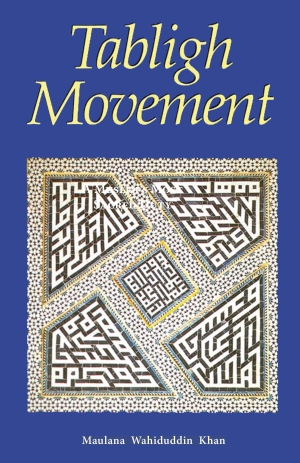The particular purpose for which God had sent the Prophet Muhammad, may peace be upon him, was to convey the message and guidance he received from God. It was the Prophet’s primary mission. If the Prophet had not undertaken this task, it would have meant that he had failed in discharging his divine duties. Moreover, that being so, his prophethood would have come under the shadow of a doubt. In other words, the prophethood of the Prophet Muhammad, may peace be upon him, could only stand proven in the eyes of God after he had completed the dawah mission. Moreover, by not completing the dawah mission, he would have failed to establish his real role and actual position.
After the end of the prophethood, the followers of the Prophet—the entire Muslim ummah—must assume the mantle of prophethood. They have to carry out the same task that the Prophet carried out in his lifetime. The very basis of their being called the followers of the Prophet is their performing dawah work on his behalf and their continuing to convey the valid message of the divine religion in its original form. If they failed to perform this mission of conveying the divine message to others, the words of the above verse of the Quran would become true, as it could have become true for the Prophet on the non-performance of dawah work. In the eyes of God, they would lose the true position of being called the followers of the Prophet Muhammad.
Featured Articles
Featured Videos
FAQs
Ibn Ishaq (the Prophet’s earliest biographer) said that when the Prophet Muhammad (upon whom be peace) came to the Companions and reminded them of the dawah work, he said: ‘God has sent me to the entire world as a blessing, so you should carry out this responsibility on my behalf. God will show His mercy to you.’
There could be no greater honour under the sun than to be engaged in a mission which is directly God’s own mission. It is like working on behalf of God Almighty. It is indeed such a great honour that a greater honour than this one seems impossible.
Dawah, which in the Quran is called ‘warning and giving glad tidings’, is directly the mission of God. So that men might have no argument with God, this task was passed on to the people themselves. Moreover, the testing of humankind, if it is to be deemed both effective and valid, should not be done by means of some miracle, but should rather be performed by human agency. That is why God wants this divine work to be performed only by human beings.
This exigency has opened up the opportunity for man to perform this great divine task. Those who come forward to carry out this divine mission of dawah will receive special succour in this life and will be held deserving of great honour in the life hereafter.
When a believer says his prayers, he understands that he is declaring his humility before God. On the other hand, when he performs dawah, he feels as if he is actually performing a task of none other than God Himself. There could not be a more thrilling experience for a believer than to feel that he is engaged in God’s own work, that he is implementing his Lord’s plan.
Source: Dawah Made Simple
Calling people to God has been referred to in the Quran as ‘helping God’ (61:14), since it is a task that is seen as desirable by God Himself and is performed by servants of God. When a believer follows the commands of God relating to worship, morality, and deals justly with people, he proves his servitude to God. But the case of dawah is different. According to the Quran, dawah work is performed so that humanity may have no excuse or argument against God (7:164).
‘Helping God’ in this verse (61:14) means giving oneself wholeheartedly to the divine mission so humanity might have no argument against God on the Day of Judgement.
Prophet Muhammad was undoubtedly the messenger of God to the whole of humanity. But he lived in this world for a limited period. After his demise, this mission had to be carried forward indirectly by his followers, the Muslim ummah. It is, therefore, incumbent upon the Prophet’s followers to carry out this mission from one generation to the next and, in presenting the message of Islam to people of every age and time, bring people closer to God so that no one can stand in front of God on Judgment Day and say, ‘I was unaware.’ This exigency has opened up the opportunity for man to perform this great divine task. Those who come forward to carry out this divine mission of dawah work will receive special succour in this life and will be held deserving of great honour in the life Hereafter.
Source: Calling People to God
The Muslim community has been called ‘The Middle Nation’ in the Quran: “We have made you a middle nation, so that you may act as witnesses for mankind, and the Messenger may be a witness for you.” (2:143)
This verse speaks of the role of Muslims as dayees. It explains that they have received the divine religion through God’s Messenger. Therefore, they now must communicate God’s message to every generation in every age. The word ‘witness’ (shahid) in this verse is equivalent to dayee.
It was the responsibility of the followers of Prophet Muhammad to pass on the truth they had received from the Prophet to others. The same responsibility devolved upon the ancient people of the Book. That is, making the message of God clear to people. (The Quran, 3:187)
The Call to God is all a matter of responsibility, and without doubt, there is no responsibility more significant than this. The Prophet of Islam is called the ‘seal of the Prophets’ in the Quran (33:40); therefore, no other Prophet will come after him. The followers of Prophet Muhammad must fulfill their responsibility of conveying the divine message to their contemporaries in every age till Doomsday. It is the duty of every Muslim, and he must perform it on a priority basis.
We should remember that conveying God’s message to humanity is to be done in a clear and understandable style to the addressees, which is retained in their minds or makes a lasting impression on their minds. In the modern era, we need to make Islam understandable to people in the language of today, i.e., modern, scientific idiom. Only by fulfilling this dawah responsibility to our utmost can we be held eligible in God’s eyes to be called the ‘Middle Nation’.
Source: Calling People to God









